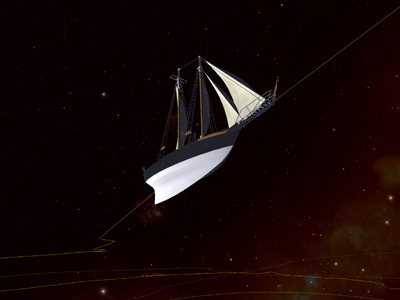As I sail on at sea for 1045 days continuously, I am reminded always of how I am on my own homemade spaceship, isolated as I cross the universe. My place at sea is very much like the place in space where the gravity of the earth and sun are equal and I feel that I could balance here forever. That which makes me feel comfortable out here for so long will also help make future astronauts adapt as they voyage into space for years at a time. Of course, what I am talking about from my ordinary self-educated adventure guy perspective are the human factors.
If we intend to send humans into space for longer periods of time and for a great mission to Mars we need to learn a lot more about the whole human being and incorporate the urge for that knowledge into the overall mission philosophy.
We could use the Mars Ocean Odyssey as a dynamic example. I propose that a magnificent unprecedented experience constantly acting upon an open soul flying through eternal space will create a super human mystic understanding if the voyager survives with grace. This would be a good expectation to believe in and prepare for.

[Excerpt from the 1000 Days Non-Stop at Sea log, Day 1045]
Those of us who leave the earth not on the wings of a spaceship but with our spirits can also glean great understanding. We have been doing this since the beginning of time. To some it is not rational, but science still has plenty of illogical moments that lead to new discoveries. A look at our past will tell us that trying to explain phenomena which are presently beyond our comprehension will lead to new knowledge that can unify science and spirit.
Understanding science and the spirit together is what humanity really needs and wants. This understanding will help the Mars mission. Mars Mission planners are aware that the public lost interest in the moon missions very fast. Public support is very important and by expanding the mission into the human realm there will be more entertainment, knowledge and hope than just scientific studies can provide.
Even before we sent humans to the moon a great Christian voice and mystic, Thomas Morton, published writings in 1960. "What can we gain by sailing to the moon if we are not able to cross the abyss that separates us from ourselves? This is the most important of all voyages of discovery and without it all the rest are not only useless but disastrous." I agree with him, but I also think voyages into space are important, magnificent, timely, and multifaceted with the greatest communal effort of men focused on a common goal. Space voyages could also be geared to cross the abyss that separates us to help bring human hearts together.
We send probes into space ignoring the benefit of equally exploring and incorporating the human heart and soul into the space program. I think the bureaucrats and technical guys in charge are embarrassed about human emotions and the subject of love. They imagine that love is too ephemeral, immeasurable, intangible, mystical and heartbreaking.
They want to train and psychoanalyze candidates for a future Mars mission, but can you imagine doing that without harnessing the power of love?
I think that most people the world over agree that love is a powerful force that can enable positive physical events. This voyage is one satellite verified example of how love has given man the power to accomplish a physical feat never before imagined possible and this accomplishment has important meaning to the Mars mission. Knowledgeable spiritual care should be included in the program for training astronauts and this should be brought to the forefront as an essential truth.